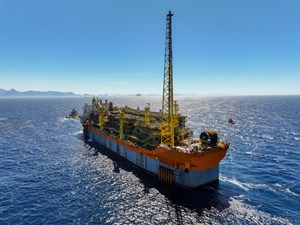Libra consortium begins oil, gas production from FPSO offshore Brazil
(WO) – Shell Brasil Petróleo Ltda., a subsidiary of Shell plc, announced the start of production of the FPSO Sepetiba in the Mero field, offshore Santos basin in Brazil. The FPSO Sepetiba, also known as Mero-2, has an operational capacity of 12 MMcmg and 180,000 bopd, and is connected to six production and six injector wells to the field, in the first wave. Technology applied in the construction and operation of the FPSO will increase production efficiency and contribute to emissions reductions.
The FPSO Sepetiba is located 180 km from the coast of Rio de Janeiro in a water depth of 2,050 m. Its predecessor, the FPSO Guanabara, also known as Mero-1, announced first production in April of 2022. The consortium plans to receive two more FPSOs by the middle of the decade. Shell’s deepwater business comprises two prolific basins in the U.S. and Brazil and an exciting exploration portfolio, with a sustained track record of strong cash generation and operational performance.
The Mero field is part of the Libra Production Sharing Contract (PSC), signed in Dec 2013. Libra is located in the Santos basin, 150-180 km south of Rio de Janeiro in 1,900-2,100 m of water depth.
SBM Offshore is responsible for the engineering, procurement, construction, mobilization, installation, and operation of FPSO Sepetiba, including topsides processing equipment as well as hull and marine systems.
Shell Brasil holds a 19.3% stake in Mero Unitized Field, along with Petrobras (operator), with a 38.6% stake, TotalEnergies (19.3%), CNPC (9.65%), CNOOC (9.65%), and PPSA (3.5%t), representing the Government in the non-contracted area.
“The FPSO Sepetiba development leverages our world-class partnership with Petrobras and reinforces our presence in one of the most productive fields in Brazil,” said Zoë Yujnovich, Shell’s Integrated Gas and Upstream Director. “This project aligns with Shell’s Powering Progress strategy and our commitment to leverage increasingly efficient and competitive developments in our heartlands to provide safe, secure energy supplies today and for decades to come.”



